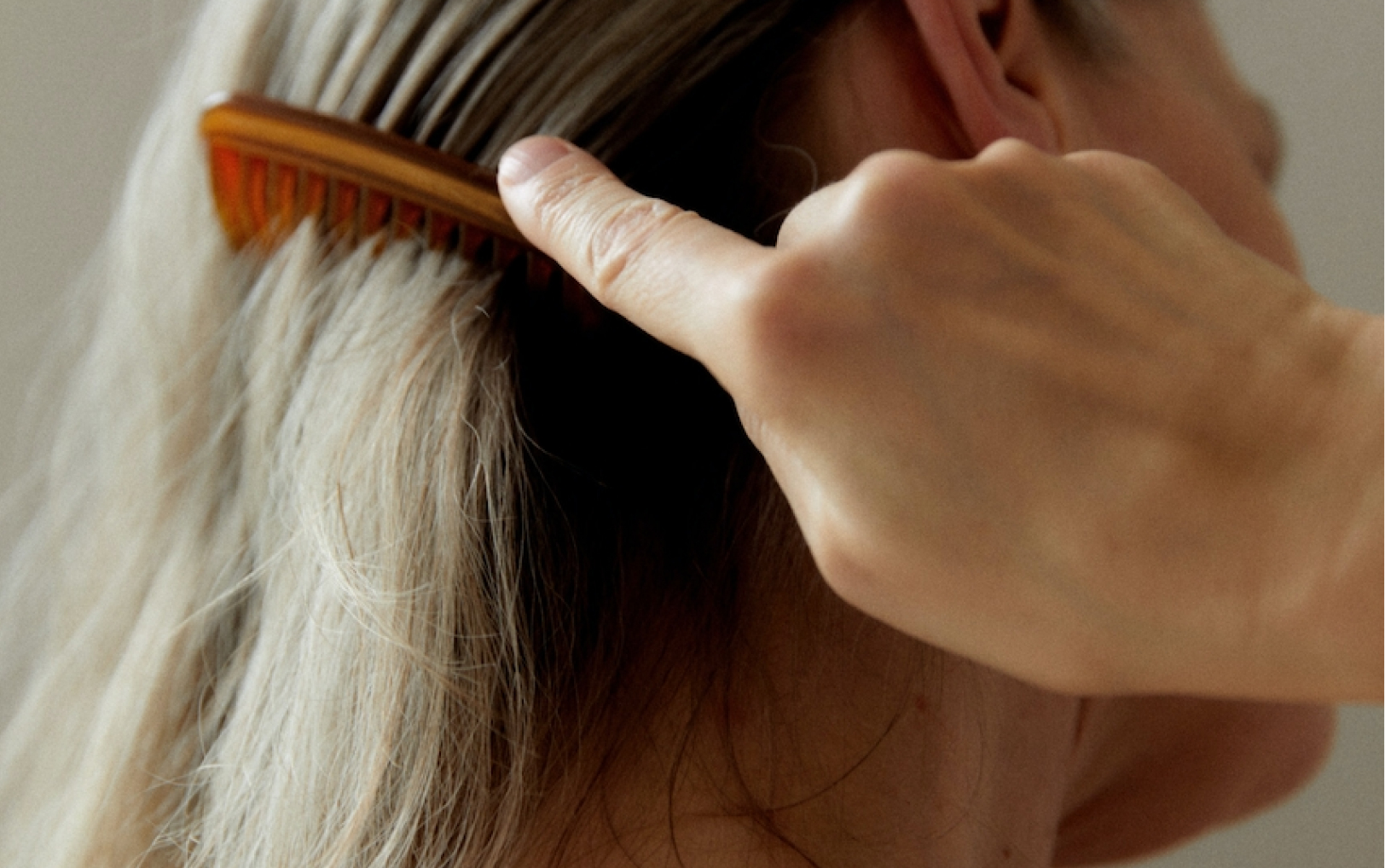nutrition
Foods to Boost Hair Growth: Your Complete Guide
On This Page

The food you eat can have an impact on the health of your hair. Read on to learn more.
It’s normal for folks to think about their hair from time to time. Hair growth and hair loss are natural parts of life, and the way you style your hair is really an individual journey.
Here’s what to know about hair loss – it can be caused by intrinsic factors, such as hormones and genetics, and it can be caused by extrinsic factors, such as oxidative stress and nutritional gaps. When hair loss is caused by extrinsic factors, you can pretty easily do something about it.
That’s what this article is all about. Can you improve your hair growth by switching up your diet? Are there some foods that can support healthy hair growth? Indeed there are, especially if your lack of adequate hair growth is caused by certain nutrient deficiencies. Keep reading, because we’ve got some suggestions for you!
How Proper Nutrition Encourages Hair Growth
Nutritional Deficiencies and Hair Health
The vitamins and minerals you get from food play a vital role in your body’s hair growth process, particularly hair follicle growth and cellular turnover. When your body lacks certain nutrients, you may experience hair loss. Some studies have found, for example, that deficiencies in vitamins D, B12, biotin, riboflavin, and iron can be connected to hair loss.
Understanding the Hair Growth Cycle
To understand how proper nutrition can support hair growth, it might be helpful to learn about the hair growth cycle. The cycle is broken into these four phases:
- Anagen. This is known as the growth phase. The longest of the hair growth cycle phases, the anagen phase can last about 3 to 5 years. This is when your hair follicles push out hairs that will keep growing until they’re either cut or they get to the end of their lifespan. At any given moment, about 90% of the hairs on your head are in this phase.
- Catagen. This is known as the transition phase. This phase kicks off at the end of the anagen phase and lasts approximately ten days. It involves the shrinking of hair follicles and the slowing of hair growth. At any given time, about 5% of the hairs on your head are in this phase.
- Telogen. This is known as the resting phase. This is a period when hairs don’t grow; they rest. This is also a period of time when new hairs start to form in the wake of hairs that have fallen out during the catagen phase.
- Exogen. This is known as the shedding phase. This is when hairs are shed from the scalp, often when you’re washing or brushing your hair. During this phase you might lose 50 to 100 hairs per day.
Getting adequate nutrient intake is an important part of making sure this cycle proceeds the way it should.
Key Nutrients for Healthy Hair Growth
Biotin: A Vital Nutrient for Hair Strength
Also known as vitamin B7, biotin is one of the eight B vitamins. Like the other B vitamins, biotin helps your body convert the food you eat into the energy you need to function. Studies show that biotin is essential for the production of keratin in the body. Here’s why that matters: Keratin is a fibrous protein in the body, essential for your body’s structural support, as well as hair health. Keratin and biotin supplements are both commonly used for supporting hair, skin, and nail health. (You can check out Care/of’s keratin supplement, dubbed The Good Hair Day, here.)
Vitamin D: Supporting Hair Follicle Health
Vitamin D is well known for how it supports bone health, but did you know it can also support your hair follicles? Data from animal studies has found that vitamin D may play a critical role in hair follicle cycling, particularly in kicking off the anagen phase. Furthermore, some studies have found connections between vitamin D deficiency and hair loss. Getting more vitamin D in your diet can help improve your hair follicle cycling and generally support hair health. Sunlight is a great natural source of vitamin D, but it can sometimes be hard to get enough vitamin D simply through sun exposure.
Iron: Essential for Oxygen Supply to Hair Follicles
Your body needs iron to help red blood cells carry oxygen throughout the body. If you have an iron deficiency – particularly if you’re a woman (or assigned female at birth) – then hair loss can be a very common presentation. That’s likely because your body relies on iron to carry oxygen to your hair follicles. In any event, it’s absolutely imperative that you speak to a medical professional before taking any iron supplements, as excess iron can be toxic. It is ill advised to take iron supplements when you don’t have a deficiency.
Omega-3 Fatty Acids: Promoting Scalp Health
Omega-3 fatty acids support your health in myriad ways. Omega-3 deficiencies have been linked to the emergence of rough, scaly skin, and this may even include the scalp. Making sure you get enough omega-3s in your diet, therefore, can be good for scalp health, which is essential to healthy hair growth. Additional research that looks into scalp health and omega 3 fatty acids is still needed.
Top Foods to Incorporate for Hair Growth
Eggs: Contain Biotin and Protein
Eggs contain biotin and protein, both of which are hugely helpful for supporting hair health. Indeed, some research has found that consuming biotin can help with hair growth in those with deficiencies however biotin deficiencies are rare. So, get some eggs from your nearby grocery store and prepare them the way you like them!
Berries: Packed with Vitamin C and Antioxidants
As mentioned above, oxidative stress can cause problems for hair health. If oxidative stress is a problem for you, you might want to try adding some berries into your diet. Berries are packed with vitamin C, which has strong antioxidant properties, along with other potent antioxidants. Antioxidants can have the effect of protecting hair follicles from harm. Moreover, the vitamin C in berries can help your body absorb iron, which is also essential to healthy hair.
Spinach: A Source of Iron and Vitamin D
Spinach is a healthy and popular green veggie, and it’s absolutely packed with helpful nutrients – vitamins A and D, iron, folate, and so on. These all play a key role in hair growth. In fact, spinach is one of the best plant-based sources of iron. It’s perhaps unsurprising, then, that studies have connected iron deficiencies to hair loss. Add some spinach to your diet and enjoy the benefits to your hair health!
Fatty Fish: Omega-3 Fatty Acids
Omega-3 fatty acids are essential to skin health which may also extend to scalp health, and there’s really no better way to get omega-3s than by adding some fatty fish to your diet! Salmon, in particular, is an excellent and delicious source of omega-3s. You also can’t go wrong with some mackerel and herring. This study shows that a blend of antioxidants with omega 3s and omega 6s may help with hair density through reducing telogen and anagen phases of hair growth. With the exciting potential, additional studies are needed.
Sweet Potatoes: Providing Beta-Carotene and Vitamin A
Sweet potatoes are an excellent and tasty source of beta-carotene. Your body converts beta-carotene into vitamin A, which can play a role in hair health. One study found that retinoic acid (a metabolite of vitamin A) regulates the induction of anagen phase (also known as the growth phase) for hair growth. So there are many areas to further explore in research.
Avocados: Loaded with Healthy Fats and Vitamin E
Avocados are very tasty and have rightly gained popularity in recent years. They also happen to be loaded with healthy fats and vitamin E, both of which are beneficial for maintaining healthy hair. Vitamin E is an antioxidant that can help reduce oxidative stress, a common cause of hair aging.
Legumes: Protein, Iron, and Zinc Powerhouses
Legumes – also known as beans and lentils – are packed with vitamins and minerals that support healthy hair including iron and zinc. Legumes are also a great option if you’re vegetarian or vegan.
Greek Yogurt: An Excellent Source of Protein and Vitamin D
Greek yogurt is a healthy and nutritious option, popular as a breakfast food. It’s loaded up with protein and depending on the brand, some may even be fortified with vitamins. Although vitamin D levels are strongly associated with bone and immune health, both vitamin D and protein are needed for supporting healthy hair. Many folks also like to add some fruit to their greek yogurt, which can provide additional nutrients like vitamin C.
Whole Foods vs. Supplements for Hair Growth: What's the Difference?
When it comes to getting enough nutrients for hair growth – indeed, when it comes to getting enough nutrients in general – you can’t beat a healthy, varied, nutrient-rich diet. Food is the optimal way to get the vitamins and minerals your body needs. Still, there are times when supplements can be the way to go. Supplements are effective for bridging nutrient gaps when you’re not getting enough nutrients in your diet. However, you should always talk to a medical professional before adding supplements to your routine.
When to Consider Hair Growth Supplements
If your hair growth problems persist, you may want to consider specially formulated hair growth supplements backed by science. But you should always talk to your dermatologist about your hair concerns before adding any new supplements to your regimen.
The Importance of a Well-Rounded Diet for Hair Growth
The best way to support hair growth is through a well-rounded diet that includes the nutrients mentioned above. It’s also important to stay hydrated.
The Role of Hydration in Hair Health
Drinking enough water can help support hair growth in a number of ways – fostering a healthy scalp, energizing hair follicles, replenishing your skin, and more. Replenishing yourself with water consistently throughout the day is a habit that can work wonders for your health overall.
The Bottom Line
We all think about our hair health from time to time. Hair growth and hair loss are both a natural part of life.
It turns out that the food you consume can contribute to hair health, by providing your body with nutrients that support it. Foods that contain biotin, iron, omega-3s, and vitamin D can be especially helpful – as can foods rich in antioxidants. Nutrient deficiencies and oxidative stress can both hinder hair health, so it’s good to eat a diet that can address them. If your nutrient deficiencies persist, some supplements may be helpful to you. Just be sure to talk to a medical professional before adding any new supplements to your regimen.



